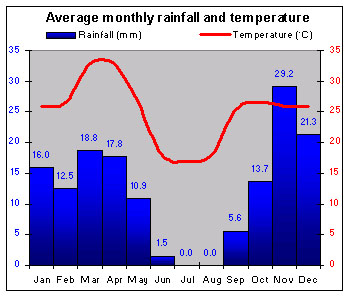COUNTRY INFORMATION |
Introduction |
Straddling the equator in west central Africa, Congo achieved independence from France in 1960, soon falling under a Marxist–Leninist form of government which discouraged much foreign investment. Multiparty democracy was achieved in 1991, but was soon overshadowed by years of feuding and violence. |
|
Climate |
 |
In most years there are two wet seasons and two dry seasons in Congo. Rainfall is heaviest in the coastal regions south of the equator. |
|
People |
| Languages |
Kongo, Teke, Lingala, French |
|
| URBAN/RURAL POPULATION DIVIDE |
|
|
|
Congo is one of the most tribally conscious countries in Africa. The main tensions are between the Bakongo, who live in the north, and the Mbochi, who are concentrated in the more prosperous south. Since the 1950s, women have achieved considerable freedom. |
|
Economy |
| GNP (US$) |
1735
|
M |
GNP World rank |
141
|
|
| Inflation |
-1 |
% |
Unemployment |
No data |
% |
|
StrengthsIncrease in importance of oil, now providing 95% of export revenues. Significant timber supplies. Skilled and well-trained workforce helps sustain substantial industrial base in the capital and Pointe-Noire. WeaknessesMassive debt burden. Top-heavy bureaucracy. Overdependence on oil. Political instability. Large refugee population. |
|
Politics |
| Lower house |
Last election |
2002 |
Next election |
2007 |
| Upper house |
Last election |
2002 |
Next election |
2008 |
|
Former Marxist dictator Sassou-Nguesso seized power in 1997 amid intense fighting which left thousands dead. Relative peace was secured in 1999. A new constitution giving greater power to the presidency was approved in 2002 and Sassou-Nguesso easily won election. Although fighting broke out again later that year, legislative elections were finally held, and won by Sassou-Nguesso's supporters. |
|
Resources |
| Minerals |
Oil, natural gas, zinc, gold, copper, potash, diamonds |
|
| Oil reserves (barrels) |
1.5bn barrels |
Oil production (barrels/day) |
271,000 b/d |
|
Oil is by far the Congo's most important resource. Natural gas reserves have yet to be exploited. There are some deposits of diamonds and potash. Bauxite and iron ore reserves are not large enough to be profitably mined and phosphate production was abandoned in 1977. Chinese aid has helped build two hydroelectric dams, on the Bouenza and Djoué rivers. A third is currently being built on the Léfini at Imboulou. |
|
Health |
| Life expectancy |
51 |
Life expect. World rank |
161 |
| Population per doctor |
3333 |
Infant mortality (per 1000 births) |
68 |
|
|
|
| Principal causes of death |
Diarrheal, parasitic and respiratory diseases, malaria |
|
The health service, set up by French military doctors at the start of the 20th century, has been devastated by civil war. |
|
Education |
| Literacy |
81 |
% |
Expend. % GNP |
5 |
%
|
|
| PERCENTAGE OF POPULATION IN FULL TIME EDUCATION |
|
| Primary |
57 |
% |
Secondary |
53 |
% |
Tertiary |
7 |
% |
|
Originally pioneered by French Roman Catholic missions, schools are still subject to inspection from Paris. |
|
Wealth |
| Cars |
14 |
per 1,000 population |
| Telephones |
7 |
per 1,000 population |
| Televisions |
13 |
per 1,000 population |
|
The oil industry in Congo has sustained an active and confident middle class. French-label products are considered to be status symbols.
|
History |
The kingdoms of Teke and Loango were incorporated as the Middle Congo (part of French Equatorial Africa) between 1880 and 1883. - 1960 Independence.
- 1964 Marxist–Leninist National Revolution Movement (MNR) becomes sole legal party.
- 1977 Yhompi-Opango head of state after President Ngoumbi's murder.
- 1979 Col. Denis Sassou-Nguesso president.
- 1992 Pascal Lissouba elected president.
- 1993 Elections: Lissouba's UPADS party gains majority.
- 1997 Lissouba ousted by Sassou-Nguesso.
- 1999 December, cease-fire signed.
- 2001 IMF starts clearing $4 billion debt.
- 2002 Referendum approves new constitution. Sassou-Nguesso wins presidential elections.
|
|